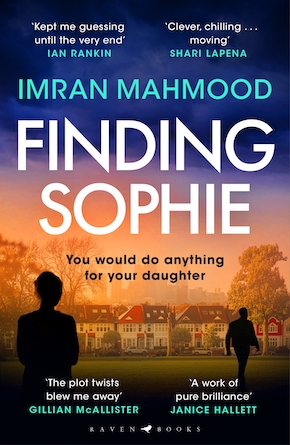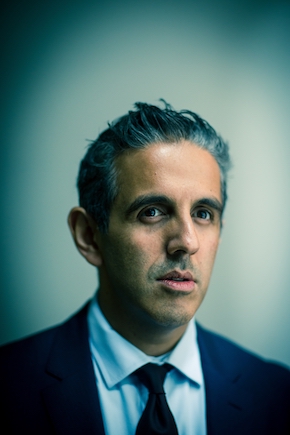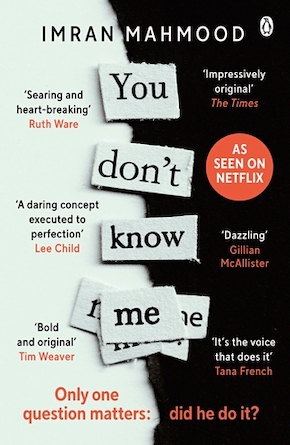Truth, love and justice
by Imran Mahmood
A MISSING-PERSON THRILLER, a study in grief, and a courtroom drama is the easiest way to pitch Imran Mahmood’s latest novel, but it is so much more. A profoundly devastating love story emerges as parents find themselves trapped in no-man’s-land. Harry and Zara’s 18-year-old daughter has been missing for six weeks, and the police aren’t any closer to finding her, or even able to establish what could have happened to her. Questions are left unanswered when suspicions can’t be investigated further, restricted by the limits of law and order. If the police can’t do anything, what options do this couple have to find Sophie?
Mahmood’s background as a criminal barrister lends authenticity to the murder trial around which the plot unfolds, and he masterfully explores the couple’s fear, despair, hope and extreme choices, alternating between their perspectives. This dual narrative structure intimately connects us with Harry and Zara’s very different internal struggles and the strain on their relationship as they try to co-exist in a ruptured world.
The novel raises a haunting question: how far will desperation drive us to seek truth and justice for those we love when the law falls short?
—
Where are you now, and where would you rather be?
I am at home in London (in my study). I’d rather be somewhere warm! Maybe Botswana or Namibia or Oman or Kuala Lumpur or Kenya or Hong Kong or – God, too many places I want to be right now!
Where and when do you do most of your writing?
I have to be really flexible about where I write because I have so little spare time. I often write on trains on the way to court or sometimes in court waiting to get called on. In the evenings I write at home in whichever room is the quietest!
If you have one, what is your pre-writing ritual?
I always re-read the last chapter just to get back into the voice and characters and to remind myself the direction the story has taken and is about to take.
What comes first – character or story?
For me the story is the character. If you have really strong characters in your head it’s fun to bring them to life and to ask – what if X or Y happened – how would that affect my character – how would they get around that problem?
When you structure your writing, are you a planner or a plotter?
I have tried to meticulously plot stories but for me they end up feeling contrived. Characters are made to do things they wouldn’t ever do, at times that are all wrong for the story. I can’t do it, though of course many brilliant writers do it so well. Another way of looking at it is that I do plan – but plan afresh every day!
How do you relax when you’re writing?
When I’m writing I’m as relaxed as the characters are. If they’re tense – I’m always tense. If they’re sad – I am. It’s not deliberate it’s just that getting into the head of a character creates an emotional response because I am trying my hardest to feel what they are feeling.
Add a single word to complete this sentence: “Finding Sophie is about _____“
love.
You’re a criminal barrister by day and a crime thriller writer by night. How do you balance the two; and how does your day job shape your fiction?
The day job gives me the ability to re-create realism when I need it. I know how a courtroom works. I know how cases are prosecuted and defended. I know what the legal elements are for each crime. That means when I write courtroom scenes I can concentrate on the story without worrying whether something is procedurally accurate.
I love the speed of scriptwriting and the immediacy. That said, nothing for me can equal the sheer indulgence of writing full-length novels.”
Tell us about Saviour, the ITV crime/courtroom thriller you’ve written. What is it about, and how did it come about?
I was approached by a TV producer who had read my books and wanted me to devise a legal drama for TV. They gave me free rein and told me to write whatever I wanted. So I created a character who is a solicitor who gets qualified to do jury trials and then – wham – immediately she gets landed with a murder case. At the same time she is fighting fires at home and secrets that will return to haunt her. The series is about the lengths you would go to save the ones you love. It’s got a really great hook I would love to tell you about, but can’t right now!
What gives you greater joy, script or novel writing?
I love the speed of scriptwriting and the immediacy. That said, nothing for me can equal the sheer indulgence of writing full-length novels. It’s like having a friend you can return to, day after day – whatever the weather – and know you’ll find a safe harbour. I am very unsettled when I don’t have a novel on the go. (Like now – I have just delivered last week my latest one!)
How would you pitch Finding Sophie to a screen exec?
Imagine your teenage daughter goes missing. You and your co-parent are desperate to find her, so you knock on every door on the street and check every message she sent to every friend she had. And after months of searching you have no luck. But there is a very creepy man who lives on the road – who just won’t open the door when you knock…
It’s hard to write heartbreak unless you’ve experienced it – but hard to write it badly once you have.”
The dynamic between Sophie’s parents, Harry and Zara, is touching and heartbreaking. You write male and female characters with depth; they’re empathetic, realistic and driven in equal measures. What’s your secret?
Ha! That’s so kind. I guess it’s hard to write heartbreak unless you’ve experienced it – but hard to write it badly once you have. I try my best to inhabit the characters and their situations for a few months before even committing pen to paper. So when I do write them into life I am familiar with their voices and how they think.
Share with us your favourite line/s of dialogue, poetry or prose.
The Persian poet Faridaddin Attar (1200s-ish) talks about the quest of the disciple: every day he asks creation where to find God, and all of the created things – sun, moon, stars, planets, wind and animals – answer that they are looking for God too. Attar’s description of the infinite yearning, as the “pining and sighing of creation” that streams through the whole universe is very moving
Which screen adaptations, in any genre, did the original books justice (or even surpassed them)?
The Silence of the Lambs! Also Misery. And many of the Bond movies (and many Grishams too). So many to choose from! Oh, and You Don’t Know Me! I think they did this really well. I was very pleased by the adaptation.
Any hidden gems in TV or book crime fiction you can recommend?
Look out for Jonny Sweet’s The Kellerby Code. Not very hidden, but outstanding. Also Vaseem Khan, who is a historical crime writer, has a contemporary one out in May that’s pretty special: The Girl in Cell A.
What are you currently reading and how did it come your way?
I am reading two books – Gillian McAllister’s Famous Last Words, and Andrea Mara’s Someone in the Attic. Both masterful in their own ways. They came my way because I am chairing a discussion with them at Waterstones Piccadilly. I am also ‘reading’ on audio Piranesi by Susanna Clarke – incredible.
Which books do you feel you ought to have read but haven’t yet?
Agatha Christie! I know – shocking – but no idea now where to start!
Which book/s made you last laugh out loud?
This is a tough one. I cried laughing reading this book – but it was 20 odd years ago – can I have this? If so – it was Catch-22 by Joseph Heller
Kindle, physical or audio?
Physical, then audio. Almost never on Kindle.
Imagine you’re the host of a literary supper, who would your dinner guests be (living or dead, real or fictional)?
Atticus Finch, Harper Lee, Count Dracula, Rumi, Omar Khayyam, Maya Angelou, Hannibal Lecter, Clarice Starling, Sherlock, and maybe since I haven’t read her, Agatha Christie!
The Red Hot Chilli Writers sounds wonderful! Can you tell us about The Chillies and how valuable they are to your writing process?
We (Vaseem Khan, Abir Mukherjee, Nadeem Khan, Ayisha Malik, Amit Dhand and I) started this podcast a few years ago and then it refined and improved itself by removing all but two from its list of regulars – leaving only the cream that is Vaseem and Abir! It’s a funny and lighthearted look at books and culture and the news of the day. Vaseem and Abir are a great double-act. Gentlemen too. All of us originals are still friends on a WhatsApp group. They are also a great sounding board for ideas and more importantly for helping solve plot problems when they come up.
How do you imagine the events of 2025 are going to shake up the crime genre in print and on screen?
No idea! We are fighting off AI, which wants to scrape all our words into its giant brain so it can regurgitate them into almost free fiction in minutes. Authors are being paid less than ever. There are so many books out there – many brilliant ones – that will never see shelf space. And the rise of the cult of the celebrity (mainly ghostwritten) book means that most of the marketing budget is gone before most ordinary writers get a sniff. It all feels pretty bleak. BUT I am an optimist and hope that the market will correct itself and publishers will recognise once again the value of nurturing high-quality writers so that they produce better and better books over time. Without that we would lose all our future Ian Rankins and Val McDermids, Grishams and Childs. And the literary world be a much poorer place.
Introduced and compiled by Farhana Gani
—

Imran Mahmood is a criminal defence barrister with over thirty years’ experience. His critically acclaimed debut novel You Don’t Know Me was adapted into a four-part BBC One crime drama, and become one of Netflix’s most streamed shows when it was released internationally. His second novel, I Know What I Saw (2022) was named a Sunday Times Crime Novel of the Month and reached No. 2 on the Audible charts. He has written three screenplays and was a founding member of the Red Hot Chilli Writers podcast. Finding Sophie is out now in paperback from Raven Books.
Read more
@imranmahmood777
@BloomsburyRaven
Farhana Gani is a freelance copywriter and book scout for film and TV, and a founding editor of Bookanista.
@bookanista
@wearebookanista.bsky.social
wearebookanista
bookanista.com/author/farhana


